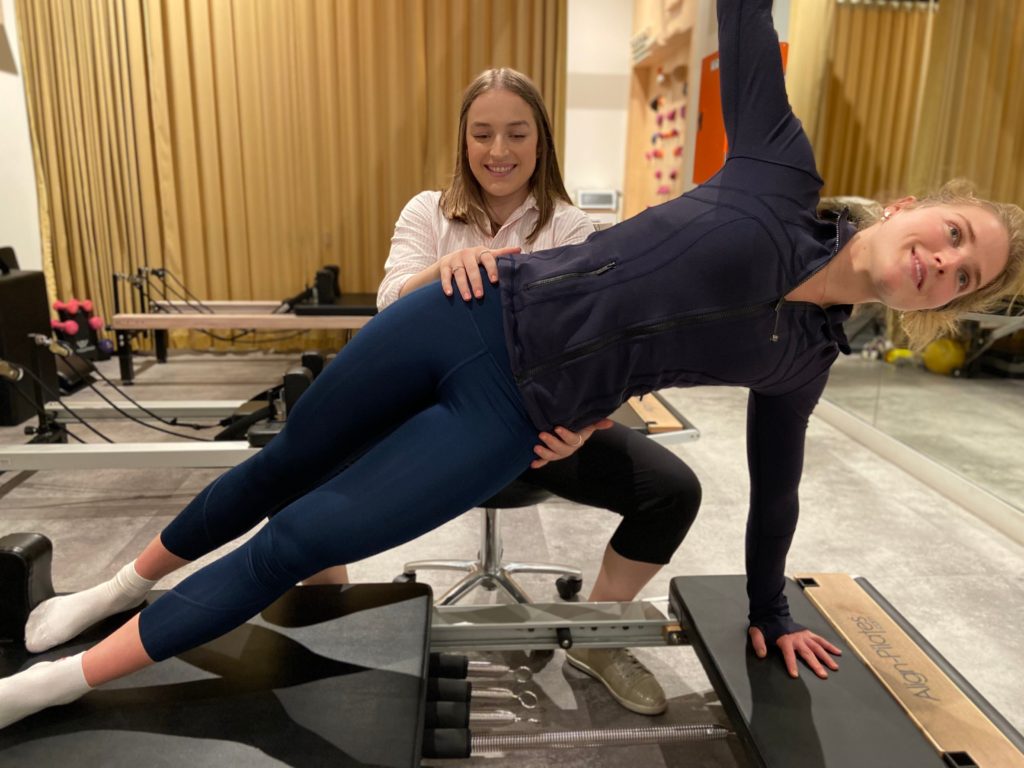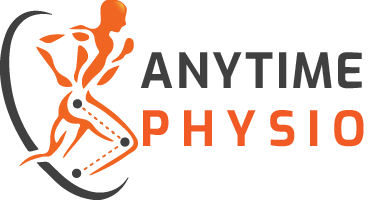WOMEN'S HEALTH PHYSIOTHERAPY
Learn how we treat Women’s Health concerns at Anytime Physio
WHAT IS A WOMEN’S HEALTH PHYSIOTHERAPIST?
A Women’s Health Physiotherapist is a physiotherapist who has undertaken extra training to treat issues that are experienced exclusively by women throughout their lifespan. This can include issues relating to pregnancy, childbirth and the postpartum period, menopause and sexual dysfunction.
A Women’s Health Physiotherapist can help with a range of problems. Click on the headings below to learn more about what a Women’s Health Physiotherapist can do.
Women’s health physiotherapists are trained to prescribe exercise programs that are safe and effective for women at all stages of pregnancy. Taking into account the significant physical changes that occur during pregnancy, we are able to tailor each program to meet the individual needs of each woman. For example, in the first trimester, when many women are feeling tired and nauseous, we might recommend gentle exercises such as walking or swimming. As the pregnancy progresses and energy levels increase, we can then start to focus on more specific goals, such as strengthening the core muscles that will support the back and pelvis to minimise lower back and pelvic pain. By working with a Women’s Health Physiotherapist, you can ensure that you are getting the most appropriate exercise for your stage of pregnancy, helping you to stay healthy and maintain your fitness levels throughout this exciting time.
Pregnancy-related pelvic girdle pain (PrPGP) is a common complaint amongst pregnant women. Pelvic girdle pain is often experienced as pain in the hips, groin or thighs when climbing stairs, walking on sand or even turning in bed. This pain can increase in intensity and disability as the pregnancy progresses. At Anytime Physio, our Women’s Health Physiotherapists follow the Australian Pregnancy Care Guidelines for managing pregnancy-related pelvic girdle pain. Our physiotherapists use support garments, braces and kinesiology tape for pain relief and prescribe specific stability exercises that are designed to address the altered movement patterns of the pelvic joints that are associated with pelvic girdle pain.
Pregnancy-related lumbopelvic pain (PrLPP) is a common complaint, affecting up to 65% of pregnant women. Lumbopelvic pain is characterised by pain in the lower back and pelvis and is typically worst in the last 3 months of pregnancy and the first 3 months after birth. Studies have shown that pelvic joint mobility is between 32-66% larger in patients with pregnancy-related lumbopelvic pain compared to women without lower back or pelvic pain. Fortunately, Women’s Health Physiotherapists can retrain your muscle function and can compensate for this decrease in stability, eliminating the negative impacts of this reduced stability.
Women’s Health Physiotherapy can play an important role in helping women to recover physically after pregnancy and childbirth. Exercise is often an important part of the rehabilitation process, as it can help to improve muscle strength and joint stability. However, it is important to ensure that any exercise program is tailored specifically to the individual’s needs and health status. Women who have recently given birth should consult with a Women’s Health Physiotherapist before starting any new exercise program. The physiotherapist will be able to assess the woman’s condition and identify any areas of concern. They will then be able to prescribe a safe and effective exercise program that will help the woman to regain her pre-pregnancy level of conditioning.
Diastasis of the rectus abdominus muscle (DRAM) is a condition that can occur during pregnancy as the abdominals stretch and thin to accommodate the growing baby. Women’s Health Physiotherapy can assist with education, exercise prescription and hands on treatment to help you prevent and manage symptoms associated with DRAM. DRAM is very common (up to 70% of pregnant women experience it to some degree) and can create doming of the abdominal contents. Research shows that compression garment prescription and exercise and rehabilitation can improve symptoms associated with DRAM, and Women’s Health Physiotherapy can help you every step of the way – from pregnancy through to postpartum. If you think you may have DRAM, book in to see a Women’s Health Physiotherapist today.
Women’s Health Physiotherapy can help with a number of lactation concerns. We can provide advice and education on how to position and attach your baby, as well as what kind of hold to use. We can also give you advice on how to manage pain associated with mastitis as well as provide pain relief through taping. If you are having difficulties with breastfeeding, we can carry out a detailed assessment to identify any potential problems and offer targeted interventions. We can also refer you to other services if necessary. Women’s Health Physiotherapy is here to help you with all your lactation needs.
De Quervain’s tenosynovitis is a condition that affects the tendons in the thumb. It is a common condition, particularly in women, and can be aggravated by pregnancy. Women’s Health Physiotherapy can help to manage the symptoms of de Quervain’s tenosynovitis during pregnancy. The condition is characterised by pain and swelling at the base of the thumb, and can make everyday tasks such as opening jars and holding a baby difficult. Women’s Health Physiotherapy can help to reduce pain and swelling, and improve thumb function. Treatment may include exercises, mobilisations, manual therapy and bracing. If you are experiencing symptoms of de Quervain’s tenosynovitis during pregnancy, Women’s Health Physiotherapy can help.
Carpal Tunnel Syndrome is a condition that can occur during pregnancy, and Women’s Health Physiotherapists are specially trained to treat this condition. Carpal Tunnel Syndrome occurs when the median nerve, which runs through the wrist, becomes compressed. This can cause numbness, tingling, and weakness in the hand and wrist. Women’s Health Physiotherapists use a variety of techniques to treat Carpal Tunnel Syndrome, including splinting, massage, and exercises. If you are experiencing symptoms of Carpal Tunnel Syndrome during pregnancy, please consult with a Women’s Health Physiotherapist for treatment.
Tarsal Tunnel Syndrome is a condition that occurs when the nerve that runs through the tarsal tunnel becomes compressed. This can cause pain, numbness, and tingling in the foot and calf. Women’s Health Physiotherapists treat Tarsal Tunnel Syndrome by assessing the root cause of the compression and developing a comprehensive treatment plan. This may involve stretching and strengthening exercises, massage, and the use of supportive devices such as arch supports. In most cases, Women’s Health Physiotherapy is highly effective in treating Tarsal Tunnel Syndrome and helping women to remain active and comfortable during pregnancy and the postpartum period.
Meralgia paraesthetica is a condition that can occur during pregnancy, characterised by pain and tingling in the outer thigh. Women’s Health Physiotherapists use a variety of techniques to help ease the pain of meralgia paraesthetica, including massage, stretching and exercises. They may also provide advice on lifestyle changes that can help to reduce the risk of developing the condition, such as wearing loose-fitting clothing and avoiding tight waistbands. By working with Women’s Health Physiotherapists, women can gain the knowledge and skills they need to manage their meralgia paraesthetica symptoms and enjoy a healthy pregnancy.
Women’s Health Physiotherapists are highly skilled in the assessment and treatment of urinary retention. Urinary retention is a condition where the bladder is unable to empty properly, and can cause a range of symptoms including urinary frequency, urgency and leakage. Women’s Health Physiotherapists use a range of techniques to treat urinary retention, including pelvic floor muscle retraining and bladder training. These evidence-based treatments are highly effective in reducing symptoms and improving quality of life. If you are experiencing urinary retention, a Women’s Health Physiotherapist can help you to find relief.
One of the most common Women’s Health conditions that we treat is urinary incontinence. Urinary incontinence is the involuntary loss of urine and can be a very distressing and frustrating condition. There are many different types of urinary incontinence, but the most common type is stress incontinence. This is when urine leaks when you cough, laugh, sneeze or exercise. Women’s Health Physiotherapy can help to treat urinary incontinence by improving the muscles and tissues around the bladder and pelvic floor. We do this by using a combination of pelvic floor exercises, education and manual therapy techniques. If you are suffering from urinary incontinence, please give us a call today to see how we can help you.
Constipation is a very common condition, characterized by infrequent bowel movements and/or difficulty passing stools. Women’s Health Physiotherapists treat constipation using a variety of techniques, including abdominal massage and pelvic floor muscle training. In addition, Women’s Health Physiotherapists often provide education on diet and lifestyle changes that can help to alleviate constipation. With the help of a Women’s Health Physiotherapist, many women are able to find relief from this bothersome condition.
Women’s Health Physiotherapists are specially trained in the treatment of faecal incontinence. Faecal incontinence is the involuntary loss of solid or liquid stool, or gas. It can be a distressing condition that can have a major impact on a woman’s quality of life. Women’s Health Physiotherapists use pelvic floor exercises to treat faecal incontinence. Pelvic floor exercises help to strengthen the muscles that support the bowel. Women’s Health Physiotherapists can also provide advice on diet and lifestyle changes that may help to improve symptoms.
Women’s Health Physiotherapists are experts in the assessment and treatment of Pelvic Floor Dysfunction and Prolapse.
Pelvic Floor Dysfunction is a condition that can cause a variety of symptoms including urinary incontinence, urgency, frequency, pelvic pain and heaviness or bulging in the vagina. Women’s Health Physiotherapists are able to assess and treat Pelvic Floor Dysfunction using a variety of techniques including pelvic floor muscle training and manual therapy.
Prolapse is a condition where the organs of the pelvis (uterus, bladder or rectum) descend into or protrude out of the vagina. Women’s Health Physiotherapists are able to provide advice and support for women with Prolapse, as well as treat any associated symptoms such as urinary incontinence or pelvic pain. Women’s Health Physiotherapists use a combination of treatments including pelvic floor muscle training, education and lifestyle advice to treat Prolapse.
Women’s sexual dysfunction can be caused by a variety of factors, including physical and psychological concerns. Women’s health physiotherapists use a range of techniques to treat sexual dysfunction, including pelvic floor muscle training, manual therapy, and education. Pelvic floor muscle training is an effective way to improve muscle tone and control, which can help to reduce pain and increase pleasure during sex. Manual therapy techniques can help to release tight muscles and improve range of motion, which can also improve sexual function. Education is an important part of women’s health physiotherapy, as it can help to address any underlying psychological issues that may be contributing to sexual dysfunction. Women’s health physiotherapists are skilled in the treatment of sexual dysfunction and can help women to improve their overall health and well-being.
Genitourinary Syndrome of Menopause (GSM) is a group of symptoms that can occur during or after menopause. These symptoms can include vaginal dryness, burning, itching, and pain during sex. Women’s Health Physiotherapy can help to treat GSM by providing education, support, and individualized treatment plans. Treatment plans may include pelvic floor muscle training, lifestyle changes, or vaginal lubricants or moisturizers. Women’s Health Physiotherapy can help you to manage your symptoms and improve your quality of life.
Women who have undergone treatment for breast cancer often experience side effects such as Lymphoedema, which can cause swelling in the arm or chest. Women’s Health Physiotherapists can help to reduce the swelling and improve range of motion. They can also help women who have undergone pelvic cancer treatment to regain strength and mobility. Women’s Health Physiotherapists use a variety of techniques, including exercise, massage, and electrical stimulation, to help their patients recover from cancer treatment. In addition, they can provide support and guidance to help women cope with the emotional challenges of cancer.
Lymphoedema is an abnormal accumulation of lymph fluid in tissues which causes swelling. Women’s Health Physiotherapy treatment for lymphoedema involves Manual Lymphatic Drainage (MLD)and compression garments. MLD is a very gentle massage that encourages the movement of lymph fluid out of the swollen area. Compression garments are used to reduce swelling and support the affected limb. Women’s Health Physiotherapists will also provide advice on skincare, exercise and diet.
Lipoedema is a condition that causes an abnormal build-up of fat cells in the body, often in the legs and arms. The cause of Lipoedema is not yet known, but it is thought to be hormonal. Women with Lipoedema often have a family member with the condition. Women’s Health Physiotherapists use a range of treatments to manage Lipoedema including manual lymphatic drainage, compression therapy, exercise and education. If you are concerned that you may have Lipoedema, please book an appointment with your Women’s Health Physiotherapist.

WHAT DOES A WOMEN’S HEALTH PHYSIOTHERAPY APPOINTMENT LOOK LIKE?
An initial Women’s Health Physiotherapy appointment will typically take 1 hour. During this time, your Women’s Health Physiotherapist will take a thorough history of your medical conditions and symptoms. They will then perform a physical examination, which may include an examination of the vagina or rectum.
Based on their findings, your Women’s Health Physiotherapist will develop a treatment plan specifically for you. This may involve education about your condition, advice on lifestyle changes, pelvic floor muscle exercises, manual therapy or other techniques.
Your Women’s Health Physiotherapist will also provide you with resources and information so that you can continue to manage your condition at home.
BOOK AN APPOINTMENT WITH A WOMEN’S HEALTH PHYSIOTHERAPIST
MEET OUR WOMEN’S HEALTH PHYSIOTHERAPIST
Breanna Walker is the Women’s Health Physiotherapist at Anytime Physio. Breanna has completed the Australian Physiotherapy Association Women’s Pelvic Health Level 2 and Women’s Health Through The Life Stages Level 1 courses. She has 6 years’ experience safely teaching women to exercise throughout pregnancy & postpartum using mat work pilates, reformer pilates and weight training. Breanna is passionate about helping women not just overcome, but thrive following an array of musculoskeletal and pelvic health concerns. At Anytime Physio, Breanna provides individualised treatment programs to help women recover from pregnancy and childbirth, manage menopausal symptoms and treat a variety of pelvic floor dysfunctions. Breanna is committed to providing holistic care that addresses the physical, emotional and social needs of her patients. If you are seeking expert women’s health physiotherapy care, make an appointment with Breanna today.

